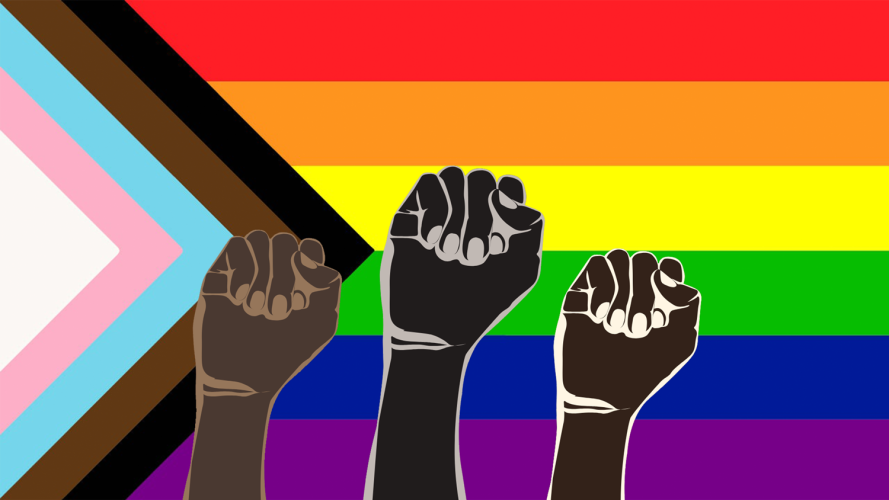As a gay, filipiino, cisgender man, I look forward to celebrating Pride Month as a time to honor our LGBTQ+ community, but this year feels different, and it is different. With ongoing racial injustices and violence against the Black community — my heart feels heavy. Systemic racism has affected the Black community for far too long and this Pride season I feel the responsibility to show up in a big way to combat racism along with homophobia, transphobia, and sexism. We need to be active allies and support the Black community in their fight for equality and justice, especially for those who identify as Black and LGBTQ+ and face multiple layers of hate and discrimination.
As we see widespread protests against racial injustices, I am reminded how Pride first evolved from a protest, the Stonewall Riots. It began because two brave transgender women of color — Marsha P. Johnson, and Sylvia Rivera — stood their ground to fight for justice and equality. If it wasn’t for them, I wouldn’t have the rights I have today.

Sylvia Rivera (left), Marsha P. Johnson (second left) and other rights activists gather for a demonstration outside New York City’s City Hall in 1973. Photo courtesy of New York Public Library, Manuscripts and Archives Division
I personally understand how hard it can be to truly feel seen, heard, and have a sense of belonging. I have spent my life advocating for others to feel that same sense of belonging and community, both in my role as Equality Programs Senior Manager and as a co-founder of Outforce, our employee resource group (ERG) for LGBTQ+ employees and allies of diversity of sexual orientation and gender identity. Shortly after Outforce formed, BOLDforce, which stands for the Black Organization for Leadership and Development, was created by visionary leaders Ayori Selassie and Leah McGowen Hare. Our two groups would meet and discuss how we could be better allies to one another and help amplify issues impacting our communities, especially for those with intersectional identities.
What is intersectionality?
Intersectionality was first coined in 1989 by Kimberlé Crenshaw, a civil rights activist and legal scholar. It refers to the complex, cumulative way in which the effects of multiple forms of discrimination (such as racism, sexism, and classism) combine, overlap, or intersect especially in the experiences of marginalized individuals or groups.
As a gay man of color, I have experienced multiple forms of discrimination as I live at the intersection of these two identities. While at the same time, I recognize there are others who experience discrimination even more deeply, such as Black transgender women who belong to one of the most marginalized communities.
Why #BlackTransLivesMatter
Black transgender people need our support right now. Despite progress in the fight for LGBTQ+ rights, transgender, and gender nonconforming people continue to suffer the consequences of racism, transphobia, and sexism and sometimes — even violence. Black transgender women/people are disproportionately impacted by violence against the community. In 2019 alone, 26 transgender/gender nonconforming people were fatally shot or killed by other violent means, and 91% of them were Black women. Riah Milton and Dominique “Rem’Mie” Fells are just a few of the names in the despairingly long list of Black transgender people who have been victims.
We, as a community, need to make sure that every Black life not only matters, but is protected, valued, celebrated, and empowered. We have a responsibility to help elevate and advocate for our Black LGBTQ+ community.
In that spirit, some colleagues, whom I admire, share their personal journeys with us

Terence Williams, Lead Designer, Salesforce Experience
“I’ve viewed my life as a paradox. I’ve often had to live two lives. One as a Black man and one as a gay man. I’ve felt the rejection of my Black family and friends because of my sexual identity. I’ve also felt the unspoken judgment, stereotyping, and dismissal that often comes from my LGBTQ+ peers who hold racist perceptions.
As a native Kentuckian, I especially feel hurt for Breonna Taylor who could have easily been someone in my family or extended circle, many of whom still live in the West End of Louisville, KY today.
Though it’s often frustrating living at this intersection, it has also given me the foresight to understand sadness is closely followed by hope. As we observe this wave of acknowledgment, dialogue, and a desire to end systemic racism, I hope underrepresented communities will also begin to assess themselves. I hope LGBTQ+ communities address the presence of anti-Blackness. I hope Black communities address the presence of homophobia. I also hope individuals assess how their own intersectional identities are expressed and will learn to be more empathetic to others.
The focus on the loss of Black life in recent weeks has heavily weighed on me, as it has the world, in a number of ways. This moment in time is a sad one, but I also believe it can be a catalyst for renewed hope. I hope that will result in action and lasting change. This moment is an opportunity for people like me to be seen and heard while embracing their entire identity. Black queer people must also have a voice in this movement.”

Amber Knighten, Einstein Analytics Solution Engineer
“I am a Black Lesbian who grew up in a God-fearing family who is currently restarting a career at the age of 40. I am the definition of the intersection! Intersectionality, as a framework, places me on both sides of many injustices. How can I represent the Black community fully while also fully representing the LGBTQ+ community, oh and represent female empowerment, and, and … ?
My answer is with education and the curiosity to understand the perspectives of others. I’ve learned to put myself into the shoes of others. I’ve had to really seek to understand differences in a way that has allowed me to truly be empathetic to the differences of others. Given the current climate, the world has now had to place a spotlight on its inequities against marginalized communities and we all must now do our part to right these inequities. I’ll be the first to admit that I don’t have all the answers, but I am doing my part to change the narrative. I am more committed today to learning about my history because history has a crazy way of repeating itself and some history DOESN’T NEED TO BE REPEATED! Let’s all do our part!”

Jesse Cooper, Sourcing Partner, Enterprise Sales and Faithforce* NYC President
“As an ordained gay deacon within the Presbyterian faith tradition, leaning into love has allowed me to respect others always. In my 40 years, I’ve been a part of many situations where others have held misperceptions about me based on past biases, only to find out we have more in common than at first glance once getting to know me, leading to long-standing friendships and stronger work relationships at times. Every time I fight anger, hate, and fear with love, compassion, empathy, and patience, I seem to gain a new ally.
I had to think for a minute as to what it takes to be a good ally to our Black LGBTQ+ community as we all have such different life experiences. I would ask those wanting to be true allies to think about their own close friends and family that they trust today. That trust and friendship was earned over time, not given. We must remember to be patient listeners when trying to connect with a community that we’re unfamiliar with, whose voice has often been silent in LGBTQ+ celebrations. We must focus on our consistent actions over time to build trust and true allyship.
Speak up when injustice is experienced anywhere, personally partner with Black LGBTQ+ individuals to co-lead Outforce events and programming, and thank a Black LGBTQ+ person in your network today for their vulnerability in living out their multiple identities proudly in this shared fight for equality and justice that we’re all experiencing together.”
During Pride Month and every month, let’s think about how we can intentionally stand up for what’s right. I encourage you all to do your part — whether it’s joining an ERG, educating yourself, to being an active ally. Learn more about how you stand up and support the Black community in this post by BOLDforce Global President, Monica Bowie.
(*Faithforce is our interfaith ERG focused on celebrating, supporting, and fostering understanding of our global faith and spiritual diversity.)




























